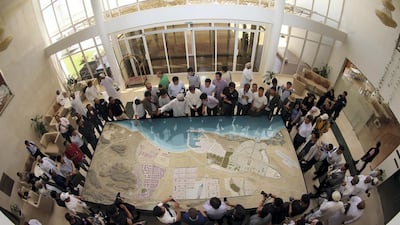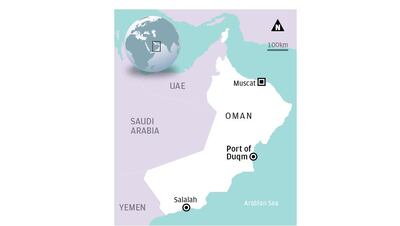Fardan Al Jabri and his twin brother Hamood loaded their nylon net in their boat as they prepared to set out for another day's work, but both stopped when they saw a huge fishing trawler sailing past less than a kilometre from the beach.
The 48-year olds looked loathingly at the vessel and made obscene gestures. Half a dozen other fishermen on the same beach that morning all shared the same feeling.
"These Chinese will soon take over everything in Duqm. More than half of the business in this town will soon be owned by them and now they are on the sea taking away our livelihood. My brother and I have been fishermen for 25 years as our father before us and his father. Our livelihood is at threat because we cannot compete with boats that size," Fardan told The National.
The feeling of being driven out of business is shared by many local businesses. Other trades which consider themselves under threat from the Chinese are carpet weaving, silver craft, carpentry and even herbal medicine.
But it is not only traders who are worried. Ordinary residents say there will soon be too many Chinese in Duqm, a town that has only 11,700 people but huge industrial potential, thanks to the Omani government's massive global marketing of the town as a major Middle East free trade zone.
Duqm, snuggled between a lonely patch of desert and beautiful white sandy beaches in central Oman, is a strategic location. Government wooing has led Asian investors to pour billions of dollars of investment into the once sleepy fishing village.
________________________
Oman to introduce new visa rules from March 21
Oman women campaign to extend paid maternity leave
________________________
The Chinese lead the way, earmarking $10.7 billion to build an industrial park, with the deal sealed last year. The park will boast a logistics hub, a methanol plant, an oil pipes factory, a property development area and a five star hotel.
But local dignitaries say that the potential influx of a "foreign element" will damage the area's character.
"There are already hundreds of Chinese starting up businesses here. Once their plants and factories are completed, there will be thousands around. I have no doubt in a few years, a major potion of Duqm will be turned into a Chinese town like we see in other countries. It is not good for our heritage and culture," said Sheikh Ghalib Al Gharbi, 51, a tribal leader and Quran school teacher.
"It is okay for a big city like Muscat where there are nearly a million people. But if we are going to have 5,000 Chinese plus other foreigners, that is nearly half of our local population. Our culture will be changed beyond recognition," Sheikh Gharib said.
Indian investors are also making inroads following the visit of Prime Minister Narendra Modi last week to Oman. One joint project under discussion is for a $1.2bn aluminium plant to be built at Duqm. Iran has also signed a deal with local partners to build a $200 million car manufacturing plant in Duqm, with construction to start in the last quarter of this year.
Traditional artisans fear the worst.
"My family has been weaving carpets for more than a century in this town. Now cheap carpets sold from Chinese establishments may drive us out of business. I think Duqm should have stayed what it was – a remote village enjoyed by tourists looking to relax on the beach or camp on its red sand dunes,” Salim Al Saadi, the local carpet weaver, told The National.
It may be too late for the likes of Mr Saadi. A vast urbanisation programme consisting of road networks and the building of more residential areas, offices, educational and health institutions is under way, and estimated to attract more than 60,000 people by 2025. Kuwait Petroleum International has entered into a joint venture with state-run Oman Oil Company to build a 230,000 barrel per day Duqm Refinery. The construction will start July this year at a total cost of $5.65 billion. Duqm is already home to a port, airport and ship repair yard.
Government officials have defended the industrialisation of the town, saying the developments are essential for the economy.
"Duqm is well positioned geographically and our partners in Asia realise how strategically important that is. However, our efforts are worldwide and we are encouraged by the interest we have received and the solid commitments from investors to build projects at Duqm," Yahya Al Jabri, chairman of the Special Economic Zone Authority Duqm, told an industry symposium in Muscat last month.
"We are certain that Duqm will be the main driver of industrial production in the country and a major source of economic diversification as well as employment."
But Khalfan Al Harbi, 22, who is studying Information Technology at the University of Nizwa, gazing at the site where the Chinese plan will take shape, questions the logic behind the government's plan.
"They want to diversify the economy in our home town, but at what price? The price of erasing and razing down the rich heritage we try so hard to preserve? Why don't they do that in the cities?” he said.


